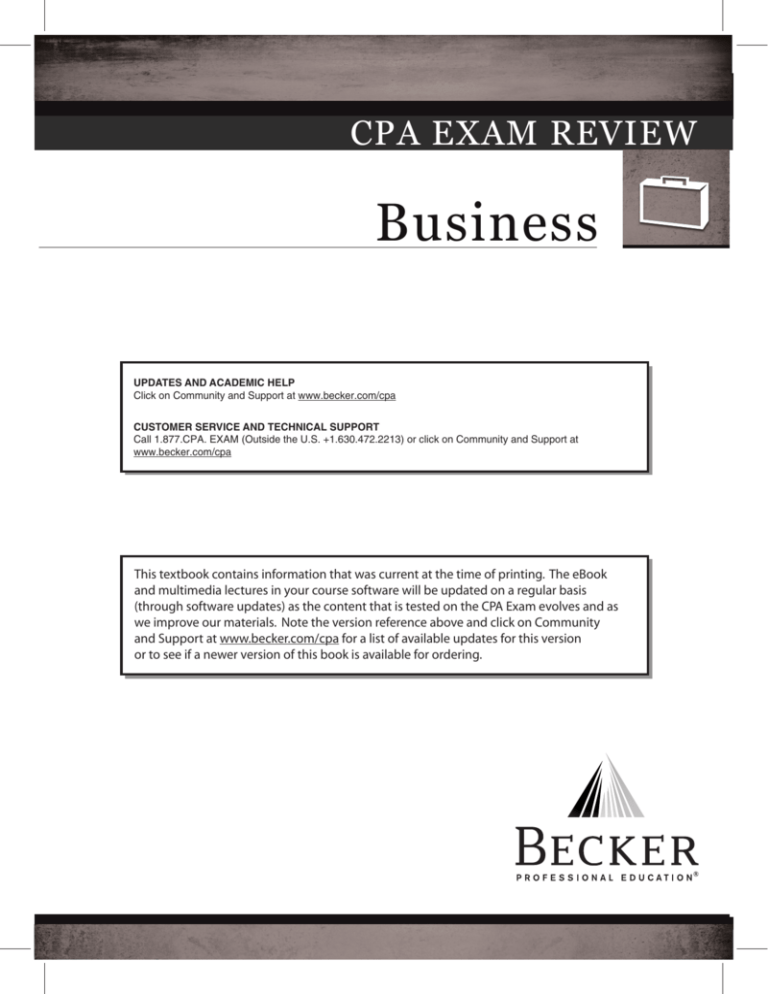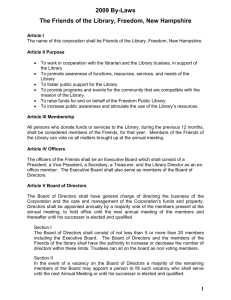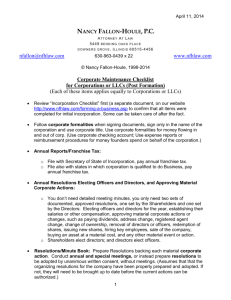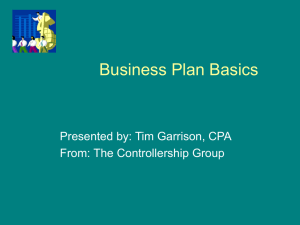
2013 Edition
V 1.0
CPA EXAM REVIEW
Business
UPDATES AND ACADEMIC HELP
Click on Community and Support at www.becker.com/cpa
CUSTOMER SERVICE AND TECHNICAL SUPPORT
Call 1.877.CPA. EXAM (Outside the U.S. +1.630.472.2213) or click on Community and Support at
www.becker.com/cpa
This textbook contains information that was current at the time of printing. The eBook
and multimedia lectures in your course software will be updated on a regular basis
(through software updates) as the content that is tested on the CPA Exam evolves and as
we improve our materials. Note the version reference above and click on Community
and Support at www.becker.com/cpa for a list of available updates for this version
or to see if a newer version of this book is available for ordering.
Business
Becker Professional Education | CPA Exam Review
BUSINESS
table of contents
Program attendance record............................................................................................................................................................... v
Introduction................................................................................................................................................................................. Intro-1
BUSINESS 1: Corporate Governance and Operations Management
1. Corporate governance............................................................................................................................................................. B1-3
2. Operations management: Performance management and impact of measures on behavior.............................................. B1-31
3. Operations management: Cost measurement methods and techniques.............................................................................. B1-39
4. Class questions...................................................................................................................................................................... B1-67
Business 2: Strategic Planning
1. Planning techniques: Forecasting and projection.................................................................................................................... B2-3
2. Planning techniques: Budgeting and analysis........................................................................................................................ B2-24
3. Class questions...................................................................................................................................................................... B2-55
Business 3: Financial Management
1. Financial modeling and analysis.............................................................................................................................................. B3-3
2. Capital management, including working capital.................................................................................................................... B3-20
3. Class questions...................................................................................................................................................................... B3-51
Business 4: Information Systems and Communications
1. Organizational needs assessment............................................................................................................................................ B4-3
2. Systems design and other elements...................................................................................................................................... B4-20
3. Security.................................................................................................................................................................................. B4-34
4. The Internet: Implications for business................................................................................................................................. B4-40
5. Types of information systems and technology risks.............................................................................................................. B4-52
6. Disaster recovery and business continuity............................................................................................................................ B4-57
7. Appendix: IT fundamentals.................................................................................................................................................... B4-60
8. Class questions...................................................................................................................................................................... B4-75
© DeVry/Becker Educational Development Corp. All rights reserved.
vii
Business
Becker Professional Education | CPA Exam Review
Business 5: Economic Concepts
1. Changes in economic and business cycles............................................................................................................................... B5-3
2. Economic measures/indicators.............................................................................................................................................. B5-13
3. Market influence on business strategies............................................................................................................................... B5-26
4. Class questions...................................................................................................................................................................... B5-57
business 6: Process and Project Management, Globalization, Financial Risk Management, Decisions, and Valuation
1. Operations management: Process management.................................................................................................................... B6-3
2. Operations management: Project management................................................................................................................... B6-14
3. Globalization and local economies........................................................................................................................................ B6-24
4. Financial risk management.................................................................................................................................................... B6-32
5. Financial decisions................................................................................................................................................................. B6-51
6. Financial valuation................................................................................................................................................................. B6-58
7. Internal auditing standards.................................................................................................................................................... B6-64
8. Class questions...................................................................................................................................................................... B6-73
Class question explanations.......................................................................................................................................................... CQ-1
Glossary................................................................................................................................................................................... Glossary-1
Index........................................................................................................................................................................................... Index-1
viii
© DeVry/Becker Educational Development Corp. All rights reserved.
Business 1
Corporate Governance and Operations Management
1. Corporate governance................................................................................................................................................................. 3
2. Operations management: Performance management and impact of measures on behavior.................................................. 31
3. Operations management: Cost measurement methods and techniques.................................................................................. 39
4. Class questions.......................................................................................................................................................................... 67
Business 1
Becker Professional Education | CPA Exam Review
C o r p o r at e g o v e r n a n c e
I.
Rights, Duties, Responsibilities, and Authority of the Board of Directors
and officers
A.
Board of Directors
The primary role of an entity's board of directors is to safeguard the company's assets and to
ultimately maximize shareholder return.
Among the specific duties of directors are the election, removal, and supervision of officers
(directors generally review the conduct of officers and may remove an officer with or without
cause); adoption, amendment, and repeal of bylaws; setting management compensation; and
initiating fundamental changes to the corporation's structure.
1.
Declaration of Distributions
The board of directors has sole discretion to declare distributions to shareholders,
including dividends, in the form of cash, property, or the corporation's own shares. The
shareholders have no power to compel a distribution.
2.Fiduciary Duties
Directors are fiduciaries of the corporation and must always act in the best interests of
the corporation. However, directors are not insurers of the corporation's success. A
director will not be liable to the corporation for acts performed or decisions made in
good faith, if conducted in a manner that the director believes to be in the best interest
of the corporation and with the care an ordinarily prudent person in a like position would
exercise. (This is sometimes called "the business judgment rule.") Thus, directors will
be liable to the corporation only for negligent acts or omissions (e.g., failure to obtain fire
insurance, hiring a convicted embezzler as treasurer without looking at his record, etc.).
a.
Right to Rely
A director is entitled to rely on information, opinions, reports, or statements
(including financial statements) if prepared by any of the following:
(1) Corporate officers, employees, or a committee of the board whom the director
reasonably believes to be reliable and competent; or
(2) Legal counsel, accountants, or other persons as to matters the director
reasonably believes are within such person's professional competence.
b.Liability for Unlawful Distributions
Directors may be held liable for authorizing a distribution in violation of law, such as
when:
(1) the corporation would not be able to pay its debts as they become due in the
regular course of business; or
(2) the corporation's total assets would be less than its total liabilities.
© DeVry/Becker Educational Development Corp. All rights reserved.
B1-3
Business 1
Becker Professional Education| CPA Exam Review
c.
Duty of Loyalty
As part of their fiduciary responsibilities, directors owe their corporation a duty of
loyalty and must act in the best interests of their corporation.
(1) The duty of loyalty prohibits directors from competing with the corporation,
but does not necessarily prohibit directors from transacting business with the
corporation (e.g., by buying from or selling to the corporation).
An action in which a director has a conflict of interest will be upheld only if:
(a) after full disclosure, the transaction is approved by a disinterested
majority of the board of directors or the shareholders; or
(b) the transaction was fair and reasonable to the corporation.
(2) The board of directors has the power to set director compensation.
d.Corporate Opportunity Doctrine
If a director is presented with a business opportunity that is of interest to his
corporation (e.g., he is told that land the corporation is interested in buying has
just been put on the market), generally the duty of loyalty prohibits the director
from taking the opportunity for himself. He must present the opportunity to the
corporation, and can take the opportunity for himself only if the corporation decides
not to take it.
3.Indemnification
Generally, corporations are allowed to indemnify directors for expenses for any lawsuit
brought against them in their corporate capacity. The corporation may also pay any
judgment imposed in a lawsuit on the director, except in a shareholder derivative suit.
4.Limitation on Director Liability
The articles of incorporation may eliminate or limit a director's liability to the corporation
for money damages for action taken as a director except to the extent of:
5.
a.
financial benefits received by the director to which the director was not entitled;
b.
intentional harm inflicted on the corporation or the shareholders;
c.
unlawful distributions authorized by the director;
d.
intentional violations of criminal law; and
e.
breaches of the duty of loyalty.
Manage Principal-Agent Conflict
Another critical role of the board of directors is to manage any potential conflict
of interests that may exist between the company's shareholders (principal) and
senior management (agent). In this intermediary role, directors work to ensure that
management does not act in a manner that could negatively impact firm value for the
sake of an individual manager's own personal gain.
B1-4
© DeVry/Becker Educational Development Corp. All rights reserved.
Becker Professional Education | CPA Exam Review
B.
Business 1
Officers
Officers are individual agents of the corporation who ordinarily manage its day-to-day
operations and may bind the corporation to contracts made on its behalf.
1.Selection and Removal
Officers are selected by the directors and may be removed by the directors with or
without cause. An officer may be removed even if the officer has a contract and the term
of the contract has not expired (although the corporation may be liable for damages in
such a case).
2.Authority
Officers are corporate agents, and agency rules determine their authority and power. A
corporate president will generally have apparent authority to enter into contracts and act
on behalf of the corporation in the ordinary course of business.
3.Fiduciary Duties and Indemnification
Corporate officers, like corporate directors, are subject to fiduciary duties and must
discharge their duties in good faith and with the same care as an ordinarily prudent
person in a like position. Similar to directors, officers may be indemnified for expenses
and judgments from litigation brought against them in their corporate capacity.
4.Also May Serve as Directors
Officers also may serve as directors of the corporation. It is not uncommon for the chief
executive officer (CEO) and/or the chief financial officer (CFO) to also serve as a member
of the board of directors.
5.Not Required to Be Shareholders
An officer is not required to be a shareholder of the corporation, but he or she may
be. As part of their compensation, senior management may receive stock options to
potentially purchase shares of the company's common stock.
II.SARBANES-OXLEY ACT OF 2002
The Sarbanes-Oxley Act of 2002 has had a profound effect on the financial reporting requirements
of public companies. In particular, there are numerous provisions for expanded disclosures by
corporations and specific representations required by officers of public companies that must
accompany published financial statements. Key provisions of the act related to those disclosures
are described in Title III and Title IV of the act.
A.Title III—Corporate Responsibility
The corporate responsibility section of the act relates to the establishment of an audit
committee and the representations made by key corporate officers, typically the chief executive
officer (CEO) and the chief financial officer (CFO).
1.Public Company Audit Committees
a.
Public companies are responsible for establishing an audit committee that is directly
responsible for the appointment, compensation, and oversight of the work of the
public accounting firm employed by that public company (also referred to as an
issuer).
(1) The auditor reports directly to the audit committee.
(2) The audit committee is responsible for resolving disputes between the auditor
and management.
© DeVry/Becker Educational Development Corp. All rights reserved.
B1-5
Business 1
Becker Professional Education| CPA Exam Review
b.
Audit committee members are to be members of the issuer's board of directors but
are to be otherwise independent. Independence criteria are as follows:
(1) Audit committee members may not accept compensation from the issuer for
consulting or advisory services.
(2) Audit committee members may not be an affiliated person of the issuer.
(Affiliation means a person having the ability to influence financial decisions).
c.
Audit committees must establish procedures to accept reports of complaints
regarding audit, accounting, or internal control issues.
(1) Procedures must accommodate confidential, anonymous reports by
employees of the issuer.
(2) Procedures must accommodate receipt and retention of complaints as well as
a method to address those complaints.
2.
Corporate Responsibility for Financial Reports
Corporate officials, typically the chief executive officer (CEO) and chief financial officer
(CFO), must sign certain representations regarding annual and quarterly reports,
including their assertion that:
a.
They have reviewed the report.
b.
The report does not contain untrue statements or omit material information.
c.
The financial statements fairly present in all material respects the financial condition
and results of operations of the issuer.
d.
The CEO and CFO signing the report have assumed responsibility for internal
controls, including assertions that:
(1) Internal controls have been designed to ensure that material information has
been made available.
(2) Internal controls have been evaluated for effectiveness as of a date within 90
days prior to the report.
(3) Their report includes their conclusions as to the effectiveness of internal
controls based upon their evaluation.
e.
The CEO and CFO signing the report assert that they have made the following
disclosures to the issuer's auditors and the audit committee:
(1) All significant deficiencies in the design or operation of internal controls which
might adversely affect the financial statements.
(2) Any fraud (regardless of materiality) that involves management or any other
employee with a significant role in internal controls.
f.
3.
The CEO and CFO signing the report must also represent whether there have been
any significant changes to internal controls.
Improper Influence on the Conduct of Audits
No officer or director, or any person acting under the direction thereof, may take any
action that would fraudulently influence, coerce, mislead, or manipulate the auditor in a
manner that would make the financial statements materially misleading.
B1-6
© DeVry/Becker Educational Development Corp. All rights reserved.
Becker Professional Education | CPA Exam Review
Business 1
4.Forfeiture of Certain Bonuses and Profits
If an issuer is required to prepare an accounting restatement due to material
noncompliance with any financial reporting requirement under the securities laws, the
CEO and CFO may be required to reimburse the issuer for:
B.
a.
bonuses or incentive-based or equity-based compensation.
b.
gains on sale of securities during that 12-month period.
Title IV—Enhanced Financial Disclosures
The enhanced financial disclosures associated with issuer reports include additional details
regarding the financial statements, internal controls, and the operations of the audit committee.
1.
Disclosures in Periodic Reports (generally quarterly or annually)
Financial statement disclosures are intended to ensure that the application of GAAP
reflects the economics of the transactions included in the report and that those
transactions are transparent to the reader. Enhanced disclosure requirements include
the following:
a.
All material correcting adjustments identified by the auditor should be reflected in
the financial statements.
b.
The financial statements should disclose all material off-balance sheet transactions:
(1) Operating leases
(2) Contingent obligations
(3) Relationships with unconsolidated subsidiaries
c.
Conformance of pro forma financial statements to the following requirements:
(1) No untrue statements
(2) No omitted material information
(3) Reconciled with GAAP basis financial statements
d.
Use of special purpose entities (SPEs).
2.Conflict of Interest Provisions
Issuers are generally prohibited from making personal loans to directors or executive
officers.
3.
a.
Exceptions apply if the consumer credit loans are made in the ordinary course of
business by the issuer.
b.
Exceptions apply if the terms offered to the officer are generally made available to
the public under similar terms and conditions with no preferential treatment.
Disclosure of Transactions Involving Management and Principal Stockholders
a.
Disclosures are required for persons who generally have direct or indirect ownership
of more than 10 percent of any class of most any equity security. Disclosures are
made by filing a statement.
b.
Statements are filed at the following times:
(1) At the time of registration.
(2) When the person achieves 10 percent ownership.
(3) If there has been a change in ownership.
© DeVry/Becker Educational Development Corp. All rights reserved.
B1-7








